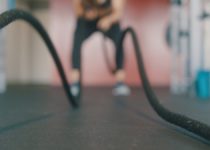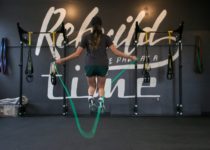How To Lean Bulk - The Real Way
Since the beginning of bodybuilding, there has been a lot of controversy about lean bulking. On the one hand, there are people supporting the perspective that hypertrophy (gain in muscle) & fat loss are not possible at the same time.
At the same time, there is the perspective that both are possible simultaneously. Science has shown, that you can do both at the same time, but it is not an easy undertaking to make it more effective than the bulking & cutting phase.
This guide is going to provide you with all the essential steps that you need to follow if you want to bulk while staying lean, both in terms of nutritional aspects & resistance training methods.
Why Should You Lean Bulk?
With the traditional bulking & cutting system you are going to have the disadvantage of having high body fat for one phase while looking more in shape in the cutting phase.
If you want to have a lean physique at all times it makes the most sense to gain muscle while losing/maintaining low amounts of body fat

Furthermore, it can make your diet plans less confusing as you don't need to design a plan for two different phases.
One last reason is that it can be more motivating, as you might lose strength while cutting or look worse while bulking.
Therefore it is more enjoyable for most people to bulk while losing stored fat at the same time!
The Myth About Clean Bulking
As previously mentioned gaining muscle mass while gaining weight is possible, although there are a lot of mistakes people do when trying to do both at the same time.
- Caloric Surplus Is Necessary To Gain Muscle
Usually, most people think, that you need to be in a caloric surplus in order to gain muscle. On the other hand, you should be in a caloric deficit to lose weight, which is true.
This leads to the conclusion for many, that both are not possible at the same time. But in reality, you can quickly build muscle while being in a caloric deficit! In the next section, we will explain how to do it!
Nutrition - Important Concepts
Nitrogen Balance
We are not going to dive too deep into this topic, although it is important to have a basic understanding of Nitrogen Balance.
In reality, it is one of the most important factors, when it comes to gaining muscle. As covered previously, a caloric surplus is not necessary/helpful at all, you rather want to focus on having a positive nitrogen balance.
But now that I have mentioned this term so often, what is it all about?
Nitrogen is an important part of amino acids, which are basically the building block of protein.
Therefore eating protein has a critical impact on your nitrogen balance.
If your nitrogen balance is positive you are going to experience muscle growth and faster muscle tissue repair.
On the other hand, a negative balance is related to burns, during serious tissue injuries and even fever.
So obviously your protein intake is a crucial factor if you are trying to gain muscle while avoiding those extra calories.
Positive Effect On Nitrogen Balance
- Protein
Right below, we have made a separate section on the role of protein, when bulking without gaining weight.
Negative Effect On Nitrogen Balance
- Poor Sleep
- Overtraining
- Inadequate Diet
Later in this guide, you will find out detailed explanations & guidelines on how to improve in these areas!
The Role Of Protein
How Much Protein To Lean Bulk?
As previously mentioned we already know, that protein has the ability to shift your Nitrogen balance towards the positive, causing faster muscle gain.
Therefore, your protein intake should be comparably high, even while staying in a calorie deficit.
To be honest getting there is not a very easy task, but unless you want to lose a lot of fat while gaining muscle, it can definitely be done.
Even without supplementation, you can get enough protein without getting in a caloric surplus. But if you decide to go without any supplements, you should consider counting calories.
Chances are high that you eat too much carbs & fat if you aren't counting calories.
- Why?
If you were about to eat a steak or chicken, most people would connect it with eating rice, bread or potatoes together, which are obviously high in carbs.
Unless you are highly aware of your nutrition (meal plans etc) it usually happens that either
- You are in a caloric deficit but your protein intake is too low
- Your protein intake is adequate but you are in a caloric surplus
But with the right diet & calorie counting, it is still going to be possible to lean bulk.
What if you don't have the time/energy?
If you've been reading this but thinking, that it is not an option for you to spend that much time on your nutrition, your best option is going to be using supplements.
The advantage of supplements is that they are easy to consume and do not need any preparation time. Furthermore, you can get high quality/the right type of protein for the situation you are in.
Especially for people that tend to have a slow metabolism, it is going to be easier to get into a caloric deficit without eating too little protein if you use supplements.
But How Much?
But after reading all of this you still don't know how much protein you should eat per day.
Since everybody has a different weight & metabolism it is impossible to give an exact number. But as a rule of thumb, you should be eating at least 1.5g of protein per kg of your own bodyweight.
This means, that if you weigh 80kg, you should be eating 120g of protein per day. Studies have shown that for the average person there is not going to be a difference between eating 1.5 or 3g of protein per kg of bodyweight.
If you want to be entirely on the safe side you can also eat 2g per kg of body weight, although you shouldn't go above that for health & digestive reasons!
What Type Of Protein
Besides getting enough protein it is important to get high quality or "the right" protein.
Before covering what types of protein to eat, it is important to gain a little overview of the different types of protein.
Complete & Incomplete Proteins
Proteins are made of amino acids, whereas the human body uses 21 different types of amino acids. There are 9 amino acids that belong to the essential amino acids.
They are:
leucine, histidine, isoleucine, phenylalanine, lysine, methionine, tryptophan, threonine and valine.
Especially if you don't want to bother too much about getting exactly the type of amino acids that you need, it would make sense to primarily eat complete protein.
Still incomplete proteins definitely have their place, but since you want to get enough of each type of amino acid in your nutrition, you will have to know what type of amino acids each type of food contains.
Read This List of the most important amino acids & their functions, if you want a more detailed overview.
Where Do You Find Complete Proteins
You can find complete proteins mainly in animal foods such as
- eggs
- dairy products
- meats
- poultry
- seafood
What if you're vegetarian/vegan?
- soy
Especially for vegetarians & vegans, soy is going to be the best source of complete protein.
Remember that you can get all the essential amino acids even from plant-based food, but you will have to combine it in the right way.
Fortunately, you do not need every single amino acid every meal, but you should try to incorporate the 9 essential types within one day!
If it is to complex for you to plan your meals you will get away by simply eating a variety of nonprocessed foods containing protein, as it will provide you with all the essential amino acids.
Two Proteins You Find In Many Supplements
When using supplements there are two types of protein that occur on a frequent basis
- Whey Protein
- Casein
In fact, both of those proteins come from dairy sources, although there is one significant difference between the two.
Its the digestion time; whey protein is digested fairly quick while casein takes a longer time to digest.
From my perspective, it is helpful to know the difference between the two, as it helps you to take the right protein at an adequate time.
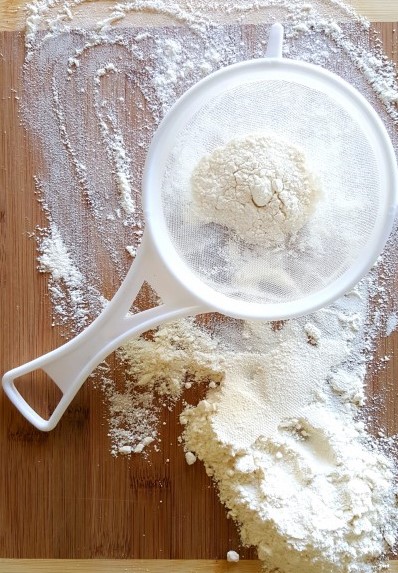
Example:
Before going to bed it would make more sense to eat food/take a supplement that contains casein as your body takes more time to absorb casein. Therefore you are going to get more protein during your sleep which obviously is a good thing.
Example:
Right after working out it makes more sense to take whey protein, which you mainly find in protein powder. Your body is going to need a lot of protein as quickly as possible which is casein wouldn't be as effective as whey.
Where To Find Them:
In milk, you are going to find a mix of whey & casein. In (low-fat) quark or skyr, you are going to get a lot of casein.
If you are looking for whey protein it is going to be the easiest to use supplementation by buying whey protein powder, which is also the most common type sold.
Foods To Avoid?
To lose fat without losing muscle, you have to stay in a caloric deficit while having a high protein intake. Therefore, there are a couple of foods that you should limit in your meal plan, while it is best to entirely avoid some type of foods.
Eat less food that is high in
- Carbs (especially ones that are digested quickly)
Avoid
- Saturated Fats (Fried food, fatty meat, fats that are solid at room temperature)
- Processed Food (Fries, frozen meals)
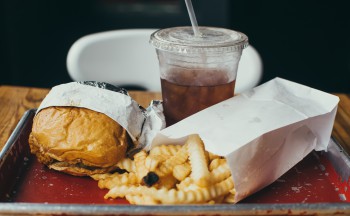
The Best Guideline For Carbs - Glycemic Index:
The best way to find out which carbs suit you best is by looking at the Glycemic Index. It basically states how long your body takes to digest different kinds of food.
The stat for each food is on a scale between 0-100, while 100 would be similar to pure glucose.
Since foods with a low glycemic index take more time to be digested it is important to eat a lot of food with a low glycemic index unless you are eating right before/right after a workout.
Why?
If you would eat white bread (glycemic index of 75) in the morning, you are going to get hungry quickly since your body takes a short time to absorb all the energy.
Unless you are going to work out straight away your body is going to store the leftover energy as fat.
For a clean bulk, you want to avoid gaining fat which is why you should eat foods with a low glycemic index unless you eat right before intense physical activity.
If you are looking for a list of foods & their glycemic index you can browse through this website.
What Should You Eat to Bulk Lean?
So as mentioned above eating foods with a low glycemic index is going to help you to lean bulk as you are going to spend less time being hungry, if the food takes a long time to be digested.
Furthermore, you should eat some unsaturated fat, although it is important to stay within a healthy range. Try to mainly use oil with high amounts of polyunsaturated fat or eat nuts occasionally as a snack.
These fats are going to be an excellent slow source for energy, meaning that they provide you with little energy over a long time.
- Walnuts
- Peanuts (high in protein)
- Pumpkin Seeds (high in protein)
- Almonds
- Safflower Oil
- Grapeseed Oil
...
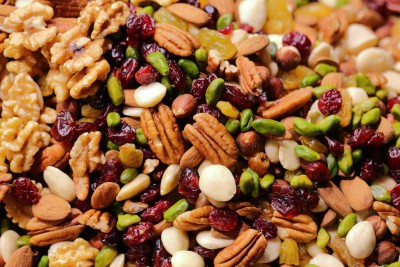
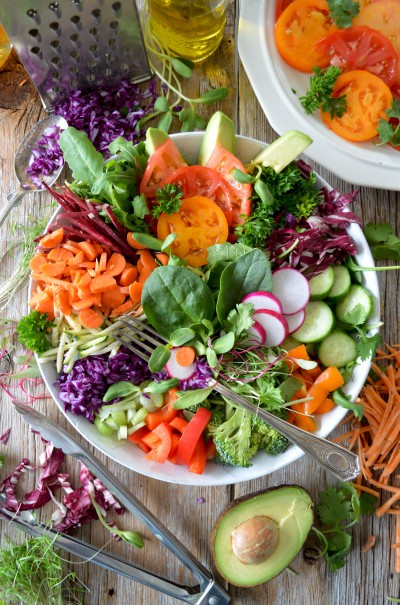
Also eating vegetables is going to help as they are digested slowly and provide you with the essential micronutrients that people tend to forget about.
- Cucumber
- Carrot
- Broccoli
- Spinach
... I hope you know that there are far more vegetables than that, which is why I didn't continue this list.
Despite that, it is important to eat food that is high in fiber, as it stabilizes your glucose levels while increasing an important hormone controlling your metabolism. (Further down we have a section on important weight loss & growth hormones)
- Chia Seeds
- Popcorn
- Dark Chocolate
- Almonds
- Cereals with added Fiber
... Other than that you can use google to find more foods that are high in fiber.
Foods High In Protein
You should be primarily eating foods that contain a high amount of proteins without having too many carbohydrates/fats etc.
- Meat with little fat
- Egg White
- Whey Protein
- Low Fat Quark
- Skyr
- Low Fat Cheese
Vegan Options:
- Soy Products
- Beans (Although it is still high in carbs)
- Lentils
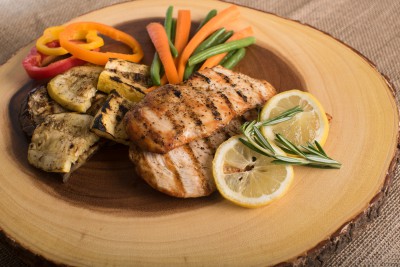
What About Calorie Intake?
Before thinking about caloric intake it is important to know your metabolism. Do you tend to have a hard time to gain muscle/fat or is it usually easy for you to gain muscle/fat?
It is going to help you to adjust your caloric intake more easily. As a hard gainer, it obviously doesn't matter too much if you eat slightly more carbs, although you still need enough protein.
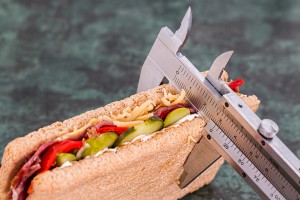
On the other hand, if you tend to gain muscle & fat easily you should focus more on staying in a caloric deficit without neglecting protein
Earlier we already scratched, that you don't need to be in a caloric surplus at all to gain muscle. But you definitely have to be in a slight caloric deficit if you want to lose weight.
Before being able to apply this to an actual nutrition plan, you need to know how to actually calculate your optimal caloric intake for clan bulking!
How to calculate your natural caloric intake:
Your caloric intake depends on various range of factors:
- Amount of physical activity
- Your Weight
- Your Body Fat Percentage
- Age
With most calorie calculators the result is not going to be exact, but overall they are going to get you a decent estimate.
Therefore you should still use a calorie calculator as a guideline! Once you found out what caloric intake is best to maintain your current weight you should go below that caloric intake.
Depending on how much & how quickly you want to lose fat or if you are just trying to maintain your lean physique you should subtract 10-30% of your daily caloric intake.
Should you count calories?
When I was counting calories I could clearly feel that I was progressing faster, as it generally makes you more aware of your nutrition. Furthermore, it helps you to gain a better understanding of the ingredients & macronutrients that each type of food has.
The big downside to counting calories is that it is going to take you a lot of time & energy in the start.
Personally I recommend using an app called MyFitnessPal, which you can get for free. It offers you all the settings that you are going to need, from scanning food to saving personal meals that you frequently cook.
After just a couple of days, it is going to get easier and easier to count your calories, although it will still take up 1-2 minutes for each meal.
Try to count your calories for at least 1-2 weeks if you have trouble motivating yourself to do it long term. But even by doing it for a relatively short period of time it is going to help you to understand how it actually feels to under/overeat.
You should still try to count calories every couple of weeks to see if you are still on track!
What Most People Forget
Sleep
Although most people know about the importance of sleep, it is still a factor that even high performing athletes neglect.
Skipping sleep is directly related to the hormone that controls hunger, which is why it is proven that a lack of sleep leads to gaining weight.

Especially if you want to gain muscle without losing fat it is vital to get 7-8 hours of sleep per day.
Furthermore, you should try to have a fairly consistent sleeping cycle whereas you don't shift your sleeping rhythm by more than 3 hours during the weekend!
Overtraining
When training, you naturally break down muscle tissue, whereas the muscle tissue recovers and gets stronger during your rest phase.
This recovery process is going to require nitrogen & time. Nitrogen comes from protein, as covered in the nutrition section.

However when overtraining it can be a problem, that your body is not capable of recovering fast enough which will lead to a loss or stagnation in muscle mass!
Therefore it is important to train at the right times, which you can figure out through the concept of supercompensation.
Another tip to avoid overtraining is by training for shorter periods of time. Instead, you can increase the intensity which is going to give you better muscle growth.
When going to the gym you want to stimulate your muscles but not totally destroy them as it is going to lead to being sore for longer than necessary.
Being sore the day after working out is totally fine but the soreness shouldn't feel like intense pain! Usually working out for more than two hours is going to be unnecessary!
Overtraining can be a big hindrance if you want to gain muscle without adding fat!
Increase Fat Burning Hormones
There are several hormones that have an important influence on gaining & losing weight and your overall metabolism.
Fortunately, you can even control the production of some of those hormones, to help you to gain muscle/lose weight more quickly.
Adiponectin
Adiponectin is a hormone that regulates glucose levels & the breakdown of fatty acids.
Therefore it is quite important to have an adequate level of Adiponectin in order to speed up the weight loss process.
Luckily, there have been studies that showed that eating fiber is related to increased Adiponectin levels, which is why it is important to step up your fiber intake if you want to bulk cleanly.
The Role Of HIIT
HIIT training has been trending as an excellent workout method to bulk & gain weight at the same time. Recently, studies have been made that scientifically discuss the relationship between HIIT & an important growth hormone.
Testosterone
Testosterone has been proven to be directly related to muscle-growth & your own metabolism.
One issue with testosterone levels is, that all the factors below primarily apply to men.
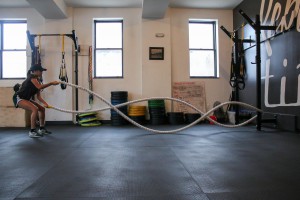
How to increase testosterone levels:
Fortunately increasing your testosterone levels is surprisingly easy; all you have to do is HIIT training.
Recently a scientific study proved, that the production of lactic acid stimulates testosterone production. The production of lactic acid happens when doing exercise in an anaerobic state which you do when doing HIIT training.
In case you don't know what HIIT is, I've written an article about different types of HIIT workouts.
But in order to get the best results, I recommend getting a more detailed HIIT running program.
Personally I have primarily based my HIIT training on a book called "Anabolic Running". If you want to find more about that, you can read my review of the book.
Overall, HIIT training is one of the neglected strategies to get lean while bulking up!
The Lean Bulk Diet
Finally, you are going to find an entire sample diet plan, to help you with lean bulking. The meals are based on the knowledge that I've covered above and are primarily made to give you a guideline.
Feel free to adjust meals etc to your liking, as long as you follow the basic guidelines.
Steps to do in advance:
- Calculate the caloric intake that you need to lean bulk
- Use an app to count your caloric intake & macronutrients (MyFitnessPal)
Sample Meals:
Breakfast
Option 1:
Skyr/Low Fat Quark with Oats, Fruit & Nuts
Option 2:
Protein Bread/Granary Bread with low-fat cheese/ham/chicken etc. (try to find an alternative for butter)
Option 3:
Intermittent fasting - Skip breakfast
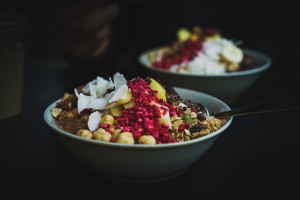
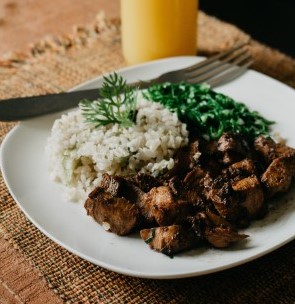
Lunch/Dinner
Meal Ideas:
Chicken with brown rice & vegetables
Steak & Potatoes
Any dish with a lot of lentils/beans
Remember to keep side dishes that are high in carbs as low as possible, try to limit the amount of rice/potatoes/pasta etc that you eat!
Snacks etc
Almonds/Walnuts/Protein Shake/Quark with fruit
Honestly, I didn't aim to create a full diet to lean bulk, as there are hundreds of articles that cover possible dishes. It is going to work best if you take use the foods that I listed above and find a dish around that type of food.
Feel free to vary the meals, but try to stay within the caloric intake that you set as your goal while eating the adequate amount of protein. If you don't know how to do that you forgot to read the sections "what about caloric intake" & "The Role Of Protein".
Summary:
I hope you enjoyed my guide on how to lose fat without losing muscle, in the end, it comes down to gaining a basic structure & discipline.
By doing frequent exercise while applying the nutrition principles & diet to lean bulk above, you are going to be able to lean bulk.
But even with the perfect diet & training schedule, you should keep in mind, that progress doesn't happen within one day!
Stay motivated & focus on your own improvement. Feel free, to share this article with your friends if you found it helpful!
If any questions remain you can leave a comment below!

